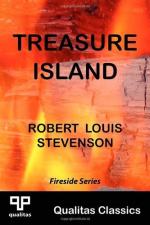The Hispaniola was rolling scuppers under in the ocean swell. The booms were tearing at the blocks, the rudder was banging to and fro, and the whole ship creaking, groaning, and jumping like a manufactory. I had to cling tight to the backstay, and the world turned giddily before my eyes, for though I was a good enough sailor when there was way on, this standing still and being rolled about like a bottle was a thing I never learned to stand without a qualm or so, above all in the morning, on an empty stomach.
Perhaps it was this—perhaps it was the look of the island, with its grey, melancholy woods, and wild stone spires, and the surf that we could both see and hear foaming and thundering on the steep beach—at least, although the sun shone bright and hot, and the shore birds were fishing and crying all around us, and you would have thought anyone would have been glad to get to land after being so long at sea, my heart sank, as the saying is, into my boots; and from the first look onward, I hated the very thought of Treasure Island.
We had a dreary morning’s work before us, for there was no sign of any wind, and the boats had to be got out and manned, and the ship warped three or four miles round the corner of the island and up the narrow passage to the haven behind Skeleton Island. I volunteered for one of the boats, where I had, of course, no business. The heat was sweltering, and the men grumbled fiercely over their work. Anderson was in command of my boat, and instead of keeping the crew in order, he grumbled as loud as the worst.
“Well,” he said with an oath, “it’s not forever.”
I thought this was a very bad sign, for up to that day the men had gone briskly and willingly about their business; but the very sight of the island had relaxed the cords of discipline.
All the way in, Long John stood by the steersman and conned the ship. He knew the passage like the palm of his hand, and though the man in the chains got everywhere more water than was down in the chart, John never hesitated once.
“There’s a strong scour with the ebb,” he said, “and this here passage has been dug out, in a manner of speaking, with a spade.”
We brought up just where the anchor was in the chart, about a third of a mile from each shore, the mainland on one side and Skeleton Island on the other. The bottom was clean sand. The plunge of our anchor sent up clouds of birds wheeling and crying over the woods, but in less than a minute they were down again and all was once more silent.
The place was entirely land-locked, buried in woods, the trees coming right down to high-water mark, the shores mostly flat, and the hilltops standing round at a distance in a sort of amphitheatre, one here, one there. Two little rivers, or rather two swamps, emptied out into this pond, as you might call it; and the foliage round that part of the shore had a kind of poisonous brightness. From the ship we could see nothing of the house or stockade, for they were quite buried among trees; and if it had not been for the chart on the companion, we might have been the first that had ever anchored there since the island arose out of the seas.




